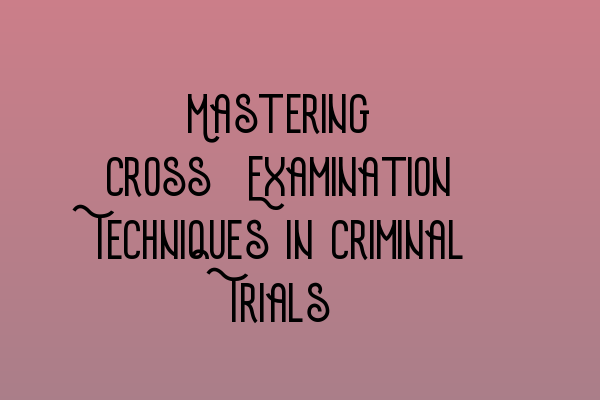Mastering Cross-Examination Techniques in Criminal Trials
Welcome to SQE Criminal Law & Practice Law UK! In this blog post, we will discuss the importance of mastering cross-examination techniques in criminal trials. Cross-examination is a crucial skill that every criminal lawyer must possess in order to effectively challenge the credibility and reliability of witnesses, expose inconsistencies in their testimonies, and ultimately advocate for their clients.
Why is Cross-Examination Important?
Cross-examination is a critical phase of a criminal trial where the opposing counsel has the opportunity to question witnesses who have testified for the prosecution. It is during this stage that the defense can challenge the witnesses’ statements, probe for inconsistencies, and elicit information that may support their case.
Effective cross-examination can help establish doubt, discredit unreliable witnesses, and create a convincing narrative that supports the defense’s theory of the case. It is a powerful tool that can sway the opinion of the judge or jury in favor of the defendant.
Mastering the Art of Cross-Examination
1. Preparation is Key:
Prior to cross-examination, it is essential to thoroughly review the witness statements, evidence, and any other relevant information related to the case. This will help identify weaknesses in the prosecution’s case and prepare a line of questioning that will effectively exploit those weaknesses.
To enhance your preparation, consider taking SQE 1 Practice Exam Questions or utilizing SQE 1 Practice Mocks FLK1 FLK2. These resources will allow you to practice your cross-examination skills and familiarize yourself with the types of questions you may encounter during a trial.
2. Establish Credibility:
During cross-examination, it is important to establish your credibility as a skilled and knowledgeable lawyer. This can be achieved by asking concise and direct questions, maintaining a calm and composed demeanor, and avoiding rude or aggressive behavior.
3. Control the Narrative:
As the cross-examiner, it is crucial to control the narrative and guide the witness to answer the questions in a way that benefits your client. This can be achieved by asking leading questions that prompt specific answers and by carefully framing the questions to elicit desired responses.
4. Listen Carefully:
Active listening is an essential skill during cross-examination. By paying close attention to the witness’s responses, body language, and tone of voice, you can identify inconsistencies or discrepancies that can be exploited to challenge their credibility.
5. Stay Focused and Flexible:
During cross-examination, unexpected developments may arise. It is important to stay focused, adapt your approach as necessary, and respond effectively to any surprises. This requires quick thinking and the ability to think on your feet.
Conclusion
Mastering cross-examination techniques in criminal trials is a crucial skill for any criminal lawyer. Effective cross-examination can help uncover the truth, challenge the credibility of witnesses, and create a compelling defense strategy.
To enhance your cross-examination skills, consider enrolling in SQE 2 Preparation Courses or SQE 1 Preparation Courses. These courses will provide you with valuable insights and practical knowledge to excel in your legal career.
Remember, cross-examination is not only about asking questions; it’s about controlling the narrative, challenging the credibility of witnesses, and strategically advocating for your clients. With dedication, practice, and a thorough understanding of the law, you can become a master of cross-examination.
For more information on SQE exams and important dates, please visit our article on SRA SQE Exam Dates.
